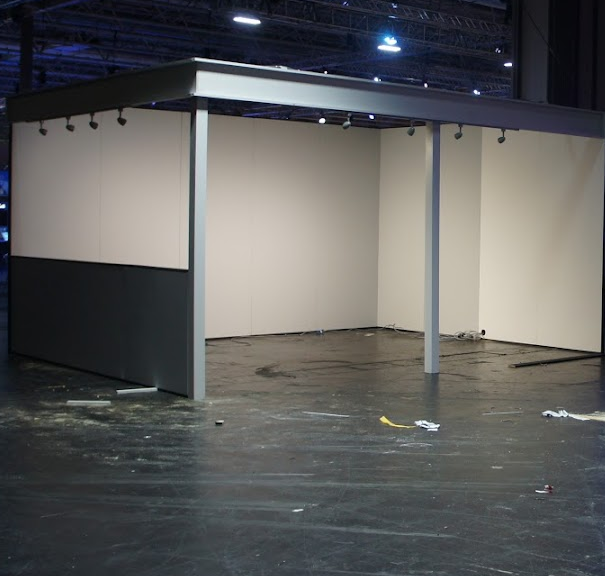As indie developers, we’re used to wearing every hat in the business. Programmer, marketer, pitch-writer, HR, finance, booth builder – we do it all. But there’s one skill that often gets overlooked, even though it saves time, money, and reputations more than any other: due diligence.
Today, we all had a real reminder of why it’s essential.
The Cold Email That Felt Like Spam
A while back, I received an email from a new event called To the Moon Expo. I’d never heard of the event, the company, or the people involved. Yet they were asking for a lot of money for booth space.
A few red flags immediately went up:
- A brand new event booking one of the UK’s largest expo halls.
I’ve shown at the NEC before. It’s a cavernous, soulless space unless you’ve got real experience and a serious budget to fill it, only then does it feel magical. No amount of enthusiasm substitutes for that. - The tone of the pitch.
The language was very crypto/tech-bro/diamond-hands/stonks. “Make Game Expos Great Again” type of messaging felt like a horrible dog whistle. And they were putting down other UK games events – something that instantly didn’t feel right. That’s not how our industry operates. - The ask.
A huge booth fee, up front, from an organisation no one had heard of. - The Time
Who is taking days off work during a weekday, or removing their kids illegally from school? It’s not even half term. Eventually it would also come to pass EGX was on in the same month at the same venue and at a weekend!
So I ignored the cold call and carried on with my life. But then things escalated.
Something Didn’t Add Up
Over the next few months, I kept spotting To the Moon sponsoring game industry events, getting game dev influencers involved, and pushing hard into UK gamedev spaces in general. They appeared to be everywhere – except in the places that actually mattered – the general public gamer spaces.
I started wondering: Where is all this money coming from?
So I did what every studio should be doing:
I checked Companies House.
The directors’ backgrounds?
- One in marketing. Fine.
- One in catering. Odd choice for running a major games expo in a venue with restaurants permanently there.
- And one: a Dubai super-yacht designer.
That was the biggest red flag of all. Why would someone with no connection to the UK games industry be bankrolling a Birmingham games event? With Dubai’s ongoing sport- and culture-washing investments, I suddenly felt very uneasy about the motivations behind it all. Even if that was not it, I couldn’t see how someone who isn’t completely involved in the UK events scene could pull off the NEC.
Next, website history.
On the Internet Archive, I discovered that their claims of 1000’s of attendees were on the site before the event was even announced. No tickets on sale. No marketing timeline. Just random numbers slapped on as if they were fact. Moving through the timeline, you see the number shoot up to 15,000 attendees with the line “we will aim” added.
Then, social media.
Their engagement and follower count was tiny. Even if everyone of their 500 followers (at the time) attended it would not be a large event. Their posts were weirdly hostile toward other UK games events. Nothing about it aligned with how our community actually behaves.
And the booth pricing.
Originally more expensive than what we got quoted by Rezzed! One email said “for a chance to win a £10,000 expo slot at our 2025 Expo”. Then the toppling over time until £125 before I eventually un-subbed from their cold call newsletter. One of the owners asked on a developer forum how to get more developers to come and speak. When I suggested to one of the owners that they pay their speakers (like I get paid to do other speaking events) – the owner was genuinely baffled that speakers expect compensation, and insisted developers should pay them for the privilege of speaking and a free ticket should be enough.
It was all deeply unprofessional. At this point I remind you that when someone says “free exposure”, you say “exposure kills”.
The Outcome: Exactly What We Feared
Before the event started I jested with some friends that it would just be a bunch of indie devs looking at each other in an empty hall, and half expected a ball pit. I did say I would be happy if it worked. And this week, 12th & 13th November 2025, the event finally happened.
Or… sort of did.
I watched socials on day one. Nothing. Not a single video, photo, or excited attendee. That was suspect! Hours passed before a clip finally surfaced – and the hall was very empty. A Dashcon-level disaster. They blamed the weather (in the UK… in winter), but the reality was obvious:
- The hall was flat lit with the service lights
- And bare of anything like carpet or decoration
- Black popup walls blocked off random areas, no decoration on them at all
- Very poor “level design”, blocking any sightlines of what little was there
- No vertical breakup of space
- Almost no booths other than the indie area which was very plain
- Zero atmosphere
Here is a video covering the two days – https://www.youtube.com/shorts/0MNW8YeK_6k
I don’t feel bad for saying “I told you so,” particularly after their team accused me of being “unwelcoming to new people in the industry” and all sorts. I feel for the indies involved, but if anything, I hope this helps other studios avoid the same trap.
Your Real Costs as an Indie
As humans, our most limited resource is time. Only so much time we get to be alive after all!
Every event you attend involves:
- Travel (cost and time)
- Accommodation
- Printing (and cost / time to design the prints)
- Meals
- Booth staffing
- Hours standing
- Hours not working on your game
- Stress before for a QA’d expo build
- Burnout / illness / conference flu after!
And if you’re running a stand, you’ll need at least two people. You cannot eat, pee, or talk meaningfully to anyone while alone at a booth.
So you need to ask:
Is this event genuinely worth the opportunity cost?
Is it better to gamble on an unknown event with red flags – or invest in established opportunities like Games Finance Market or an online Meet2Match?
Often, it’s cheaper and more effective to bring your prototype to a local gamedev meetup or a pub board-game night. And when you do consider attending something bigger, the most important question is:
Are the people I want to meet going?
Not “could they go,” but “are they already committed?”. The influencer, press, funder, publisher?
It makes a huge difference. It’ll tell you they are, they think it’s valuable to them. If not – that needs to be a red flag too.
Steps Every Indie Should Take Before Saying Yes (to anything!)
If there’s one takeaway from all of this, it’s that due diligence isn’t optional – it’s essential.
1. Verify the company name and company number.
If they won’t give it to you, that’s an instant no.
2. Check Companies House.
Look at:
- Directors
- Shareholders
- Linked businesses
- Accounts filings
- Insolvency history, including that of the linked persons of interest
This is exactly what public records are for. And if anyone ever tells you that checking Companies House is “is wrong” (like another developer said to me!) – ignore them. I even do it when buying something as simple as a piece of furniture from a small supplier. It’s a basic, essential business tool.
3. Check their website history on Internet Archive.
Look for sudden changes in claims, inconsistent details, or manufactured numbers.
4. Check the backgrounds of the people involved.
LinkedIn is your friend. Are they actually connected to games? Do they have relevant experience?
5. Check their socials.
Are real people engaging? Are the replies weird or hostile? Do their numbers match reality? Do you see them organically on other socials like Reddit?
6. Trust your gut.
If everything looks wrong, walk away. If the event ends up great, you can always join next year when they’ve proven themselves.
7. If you move forward, insist on paperwork.
Before paying a penny, ask for:
- Contracts
- Insurance details
- Risk assessments
- Event layout plans
- On-site logistics
- Load-in and safety documentation
A legitimate event will already have all of this prepared when it comes to the stage of selling stands or tickets.
My Final Thoughts
As indie devs, we’re often targeted because we’re passionate, ambitious, and eager to get our games out there. But not every ‘opportunity’ is positive – and not every flashy pitch is worth your time or money.
Due diligence protects you.
It protects your studio.
It protects your team.
Your time is precious. Your money is limited.
Spend both wisely ❤️
EDITs
So there’s a lot of fallout, not unexpected.
If you are offered pay, or a cut of something – if they are new always ask for a signing fee. This is also useful advise for freelancers. Have clauses in your contract for if they pull out of the offer etc. This creator pulling out did the right thing.


